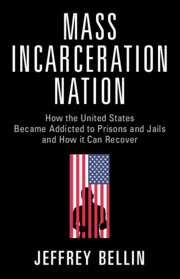 Mass Incarceration Nation
Mass Incarceration Nation Book contents
- Mass Incarceration Nation
- Mass Incarceration Nation
- Copyright page
- Contents
- Figures
- Tables
- Acknowledgments
- Introduction
- Part I What Is Mass Incarceration?
- Part II The Building Blocks of Mass Incarceration
- Part III The Mechanics of Mass Incarceration
- 10 More Police, Different Arrests
- 11 Prosecutors Turning Arrests into Convictions
- 12 Judges Turning Convictions into Incarceration
- 13 Judicial Interpretation
- 14 Punishing Repeat Offenses
- 15 The Parole-and-Probation-to-Prison Pipeline
- 16 Disappearing Pardons
- 17 The Mindlessness of Jail
- Part IV The Road to Recovery
- Conclusion
- Notes
- Index
17 - The Mindlessness of Jail
from Part III - The Mechanics of Mass Incarceration
Published online by Cambridge University Press: 03 November 2022
- Mass Incarceration Nation
- Mass Incarceration Nation
- Copyright page
- Contents
- Figures
- Tables
- Acknowledgments
- Introduction
- Part I What Is Mass Incarceration?
- Part II The Building Blocks of Mass Incarceration
- Part III The Mechanics of Mass Incarceration
- 10 More Police, Different Arrests
- 11 Prosecutors Turning Arrests into Convictions
- 12 Judges Turning Convictions into Incarceration
- 13 Judicial Interpretation
- 14 Punishing Repeat Offenses
- 15 The Parole-and-Probation-to-Prison Pipeline
- 16 Disappearing Pardons
- 17 The Mindlessness of Jail
- Part IV The Road to Recovery
- Conclusion
- Notes
- Index
Summary
American incarceration takes two distinct forms. People locked up for a short time are typically placed in a local jail, not a State prison. The primary benefits of jails are logistical. Jails are close to the police stations that generate arrests and the courts that process them. For prisoners, jails are nearer to home, family, and friends. There is, however, little to do in jails, since jails are intended for short-term stays. People locked up for longer periods, generally more than a year, are sent to a prison. Prisons are usually larger and more centralized and thus likely to be farther from the scene of the arrest, the sentencing court, and the prisoner’s home and loved ones. Since prisons are intended for longer stays, they have, or at least should have, more programs, like jobs and education.
- Type
- Chapter
- Information
- Mass Incarceration NationHow the United States Became Addicted to Prisons and Jails and How It Can Recover, pp. 157 - 162Publisher: Cambridge University PressPrint publication year: 2022


